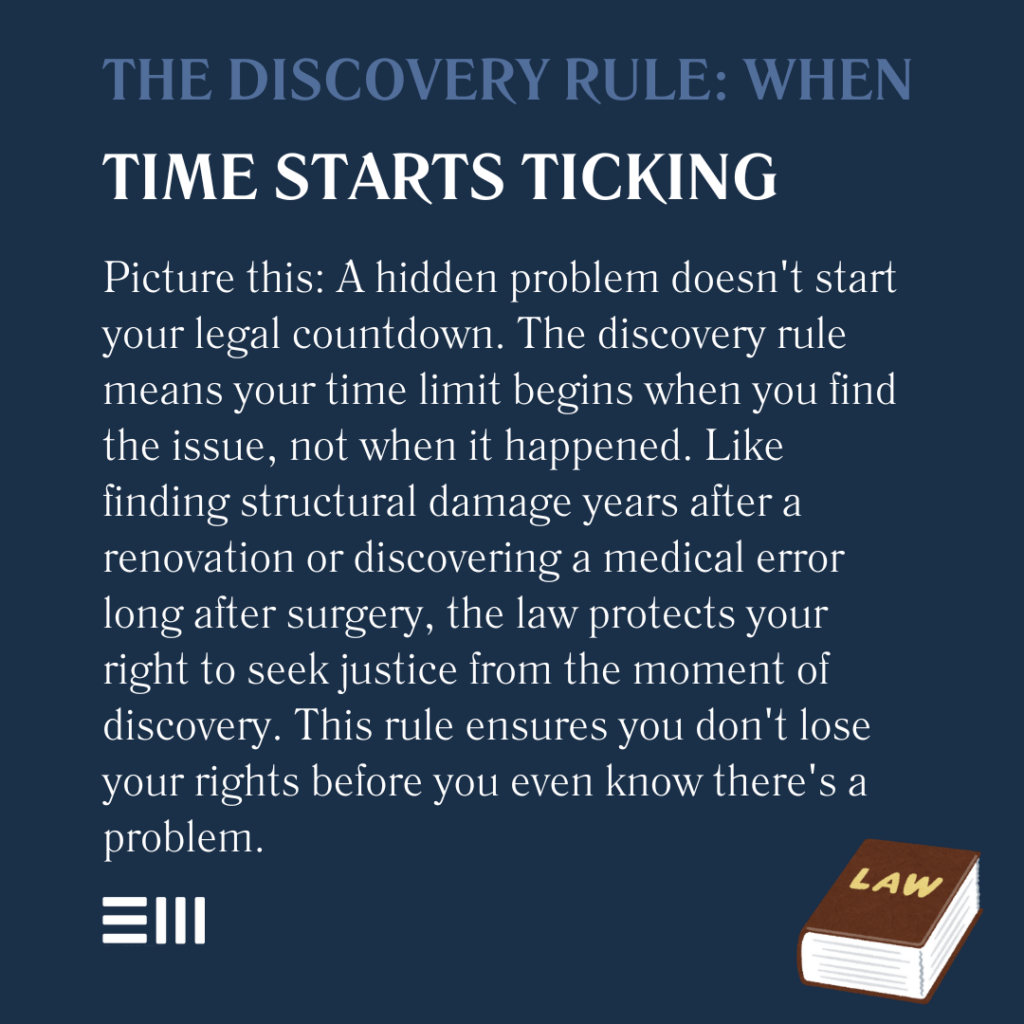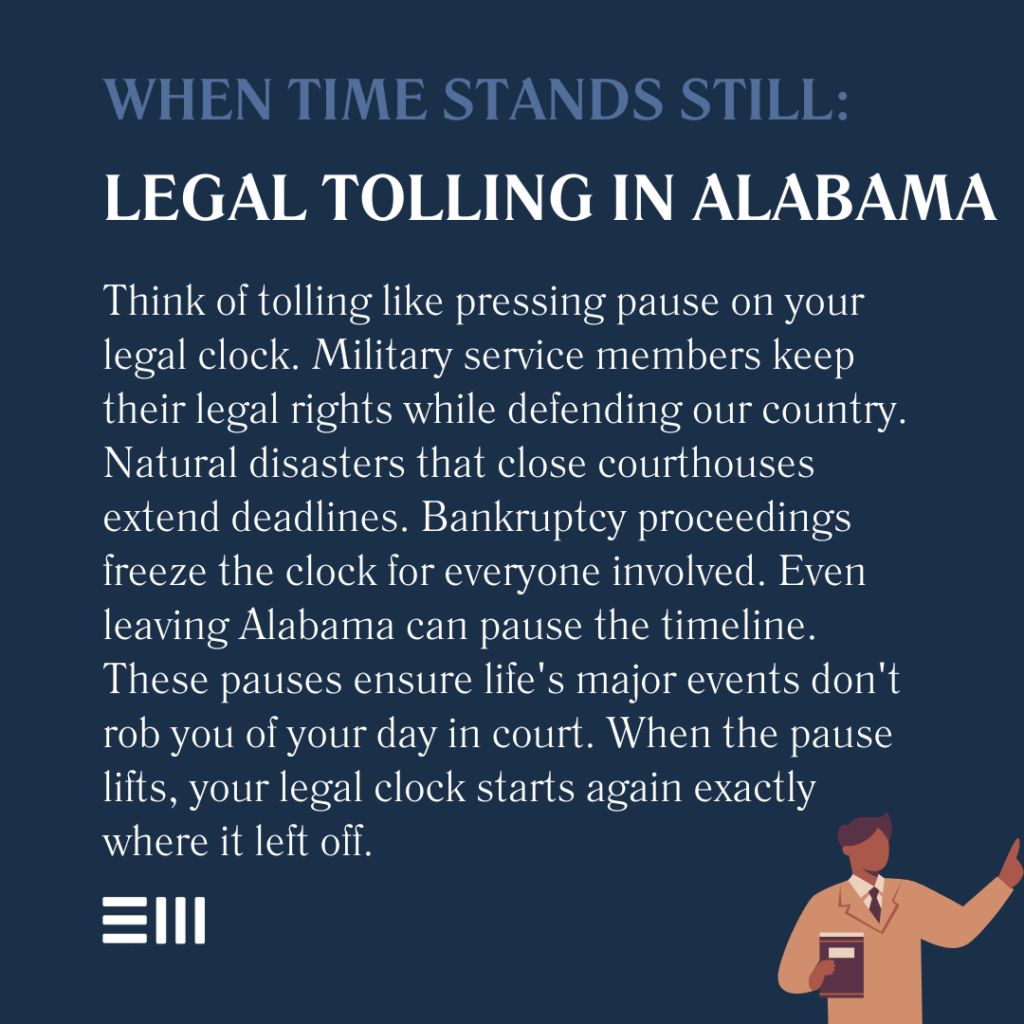
Time doesn’t always march forward when it comes to legal deadlines.
Behind every dismissed legal case lies a story of someone who might have found justice—if only they had understood how time limits work in Alabama courts.
While Alabama law sets strict deadlines for filing claims, it also recognizes that life’s complexities sometimes demand flexibility.
Hidden injuries, concealed evidence, military service, or even natural disasters can all affect your right to seek justice in ways many never expect until it’s too late.
Understanding Statute of Limitations Exceptions and Tolling in Alabama
The clock on legal claims can pause, stop, or even restart under specific circumstances in Alabama.
From military service to fraudulent concealment, these exceptions serve as vital safeguards for plaintiffs who face legitimate barriers to filing their claims within standard timeframes.
Understanding these exceptions can mean the difference between seeking justice and losing your rights forever.
Common Exceptions to Statutes of Limitations
Before diving into specific exceptions, it’s important to understand that these provisions exist to protect individuals who, through no fault of their own, are unable to pursue their legal claims within normal time limits.
These exceptions reflect the legal system’s commitment to fairness and equal access to justice.
- Discovery Rule: This exception applies when the injury or damage isn’t immediately apparent. For example, in medical malpractice cases, the clock may start only when the patient discovers or reasonably should have discovered the injury. This often applies in cases involving surgical errors where complications don’t manifest until years after the procedure.
- Fraudulent Concealment: When a defendant actively hides their wrongdoing, the statute of limitations may be tolled until the fraud is discovered. This prevents wrongdoers from benefiting from their deceptive actions. For instance, if a contractor deliberately conceals defective work behind walls, the limitations period might not begin until the homeowner discovers the hidden damage.
- Legal Disability: Minors and individuals with mental incapacities receive special protections under Alabama law, with the statute of limitations typically not beginning until the disability is removed. For minors, this usually means the clock starts running on their 19th birthday, giving them full opportunity to pursue their legal rights as adults.
- Continuous Tort: In cases where the wrongful conduct continues over time, each new instance may restart the limitations period. Environmental contamination cases often fall into this category, as the damage continues to occur daily.
These exceptions ensure that justice remains accessible even when circumstances prevent immediate legal action, protecting the rights of those who might otherwise be unfairly barred from seeking remedies.

Tolling Circumstances in Alabama Courts
Tolling provisions temporarily suspend the running of the statute of limitations under specific conditions. Understanding these provisions is crucial for preserving legal rights in complex situations.
Here’s what triggers tolling in Alabama:
- Military Service: Active duty service members benefit from tolling under the Servicemembers Civil Relief Act (SCRA). This federal law ensures that military personnel can focus on their duties without worrying about statutes of limitations expiring during their service.
- Bankruptcy: The automatic stay in bankruptcy proceedings can toll certain statutes of limitations. This protection extends to both the debtor and creditors, ensuring that bankruptcy procedures don’t unfairly impact legal rights.
- Absence from State: When defendants leave Alabama, the time they’re away may not count toward the limitations period. This prevents defendants from avoiding liability by simply leaving the jurisdiction until the statute expires.
- Pending Administrative Proceedings: Some claims require exhausting administrative remedies before filing suit, during which time the statute may be tolled. This commonly applies in employment discrimination cases or government tort claims.
- Court closures due to hurricanes, tornadoes, or other natural disasters may toll deadlines, ensuring that plaintiffs don’t lose rights due to circumstances beyond their control.
Understanding these tolling circumstances can mean the difference between preserving and losing your legal rights in complex situations.

Special Considerations for Different Claim Types
Each type of legal claim may interact differently with exceptions and tolling provisions. The specific nature of your case can significantly impact how these rules apply.
Consider these specific scenarios:
- Personal Injury Claims: May be tolled during periods of physical or mental incapacity resulting from the injury itself. For example, if an accident leaves someone in a coma, the statute of limitations may be tolled during their incapacitation.
- Contract Disputes: Partial payments or written acknowledgments of debt can restart the limitations period. Even a small payment toward an old debt might revive the entire claim.
- Property Claims: Adverse possession claims may be tolled during periods of disability or absence from the state. This protects property owners who are temporarily unable to defend their rights.
- Product Liability: The discovery rule often plays a crucial role when defects aren’t immediately apparent. For instance, if a defective medical device fails years after implantation, the statute might not begin running until the failure is discovered.
These variations highlight the importance of understanding how different claims interact with tolling provisions and why early legal consultation can be crucial for preserving rights.
Frequently Asked Questions About the Statute of Limitations in Alabama
Legal deadlines can be complex, and many people have questions about how exceptions and tolling might affect their cases.
These answers address the most common concerns we encounter when discussing Alabama’s statutes of limitations.
What Happens if I Miss the Statute of Limitations?
Missing the deadline typically bars your claim permanently, but exceptions may apply. Consult an attorney to evaluate whether any tolling circumstances might preserve your rights. Even if you think you’ve missed the deadline, certain exceptions could still protect your claim.
How Does the Discovery Rule Work in Medical Cases?
The discovery rule allows the statute of limitations to begin running when you discover or reasonably should have discovered your injury rather than when the medical error occurred.
This protection is particularly important in cases involving misdiagnosis or surgical errors that may not become apparent for years.
Can Verbal Agreements Extend the Statute of Limitations?
Generally, no. Extensions to the statute of limitations usually require written documentation, though certain actions like partial payments may restart the clock. Written acknowledgment of the debt or obligation provides the clearest protection.
Does Leaving the State Stop the Clock on All Claims?
Not automatically. The effect of leaving the state varies depending on the type of claim and circumstances of departure. Consult an attorney for specific guidance. Business-related absences may be treated differently than personal relocations.
How Do Courts Handle Multiple Tolling Events?
When multiple tolling circumstances overlap, courts carefully analyze each period to determine the total extension. For example, military service combined with legal disability might result in a significantly extended filing period.
Take Action to Protect Your Legal Rights
Understanding exceptions and tolling circumstances is just the first step. To ensure your rights are protected, you need experienced legal guidance to navigate these complex rules effectively.
Don’t let uncertainty about legal deadlines prevent you from seeking justice. Contact Baxley Maniscalco today for a comprehensive evaluation of your case.
Can't find what you're looking for? Search our site below.










